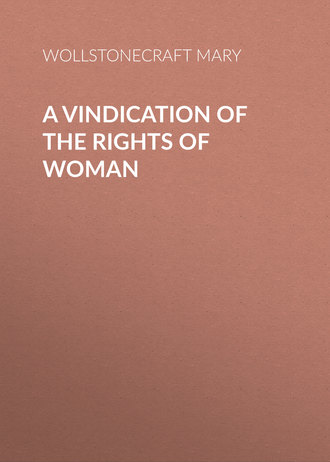 полная версия
полная версияA Vindication of the Rights of Woman
Thus Milton describes our first frail mother; though when he tells us that women are formed for softness and sweet attractive grace, I cannot comprehend his meaning, unless, in the true Mahometan strain, he meant to deprive us of souls, and insinuate that we were beings only designed by sweet attractive grace, and docile blind obedience, to gratify the senses of man when he can no longer soar on the wing of contemplation.
How grossly do they insult us, who thus advise us only to render ourselves gentle, domestic brutes! For instance, the winning softness, so warmly, and frequently recommended, that governs by obeying. What childish expressions, and how insignificant is the being—can it be an immortal one? who will condescend to govern by such sinister methods! "Certainly," says Lord Bacon, "man is of kin to the beasts by his body: and if he be not of kin to God by his spirit, he is a base and ignoble creature!" Men, indeed, appear to me to act in a very unphilosophical manner, when they try to secure the good conduct of women by attempting to keep them always in a state of childhood. Rousseau was more consistent when he wished to stop the progress of reason in both sexes; for if men eat of the tree of knowledge, women will come in for a taste: but, from the imperfect cultivation which their understandings now receive, they only attain a knowledge of evil.
Children, I grant, should be innocent; but when the epithet is applied to men, or women, it is but a civil term for weakness. For if it be allowed that women were destined by Providence to acquire human virtues, and by the exercise of their understandings, that stability of character which is the firmest ground to rest our future hopes upon, they must be permitted to turn to the fountain of light, and not forced to shape their course by the twinkling of a mere satellite. Milton, I grant, was of a very different opinion; for he only bends to the indefeasible right of beauty, though it would be difficult to render two passages, which I now mean to contrast, consistent: but into similar inconsistencies are great men often led by their senses:—
"To whom thus Eve with perfect beauty adorned:My author and disposer, what thou bidstUnargued I obey; so God ordains;God is thy law, thou mine; to know no moreIs woman's happiest knowledge and her praise."These are exactly the arguments that I have used to children; but I have added, "Your reason is now gaining strength, and, till it arrives at some degree of maturity, you must look up to me for advice: then you ought to THINK, and only rely on God."
Yet, in the following lines, Milton seems to coincide with me, when he makes Adam thus expostulate with his Maker:—
"Hast thou not made me here thy substitute,And these inferior far beneath me set?Among unequals what societyCan sort, what harmony or delight?Which must be mutual, in proportion dueGiven and received; but in disparityThe one intense, the other still remissCannot well suit with either, but soon proveTedious alike: of fellowship I speakSuch as I seek fit to participateAll rational delight."In treating, therefore, of the manners of women, let us, disregarding sensual arguments, trace what we should endeavour to make them in order to co-operate, if the expression be not too bold, with the Supreme Being.
By individual education, I mean—for the sense of the word is not precisely defined—such an attention to a child as will slowly sharpen the senses, form the temper, regulate the passions, as they begin to ferment, and set the understanding to work before the body arrives at maturity; so that the man may only have to proceed, not to begin, the important task of learning to think and reason.
To prevent any misconstruction, I must add, that I do not believe that a private education can work the wonders which some sanguine writers have attributed to it. Men and women must be educated, in a great degree, by the opinions and manners of the society they live in. In every age there has been a stream of popular opinion that has carried all before it, and given a family character, as it were, to the century. It may then fairly be inferred, that, till society be differently constituted, much cannot be expected from education. It is, however, sufficient for my present purpose to assert, that, whatever effect circumstances have on the abilities, every being may become virtuous by the exercise of its own reason; for if but one being was created with vicious inclinations—that is, positively bad— what can save us from atheism? or if we worship a God, is not that God a devil?
Consequently, the most perfect education, in my opinion, is such an exercise of the understanding as is best calculated to strengthen the body and form the heart; or, in other words, to enable the individual to attain such habits of virtue as will render it independent. In fact, it is a farce to call any being virtuous whose virtues do not result from the exercise of its own reason. This was Rousseau's opinion respecting men: I extend it to women, and confidently assert that they have been drawn out of their sphere by false refinement, and not by an endeavour to acquire masculine qualities. Still the regal homage which they receive is so intoxicating, that, till the manners of the times are changed, and formed on more reasonable principles, it may be impossible to convince them that the illegitimate power, which they obtain by degrading themselves, is a curse, and that they must return to nature and equality, if they wish to secure the placid satisfaction that unsophisticated affections impart. But for this epoch we must wait—wait, perhaps, till kings and nobles, enlightened by reason, and, preferring the real dignity of man to childish state, throw off their gaudy hereditary trappings; and if then women do not resign the arbitrary power of beauty, they will prove that they have LESS mind than man. I may be accused of arrogance; still I must declare, what I firmly believe, that all the writers who have written on the subject of female education and manners, from Rousseau to Dr. Gregory, have contributed to render women more artificial, weaker characters, than they would otherwise have been; and, consequently, more useless members of society. I might have expressed this conviction in a lower key; but I am afraid it would have been the whine of affectation, and not the faithful expression of my feelings, of the clear result, which experience and reflection have led me to draw. When I come to that division of the subject, I shall advert to the passages that I more particularly disapprove of, in the works of the authors I have just alluded to; but it is first necessary to observe, that my objection extends to the whole purport of those books, which tend, in my opinion, to degrade one half of the human species, and render women pleasing at the expense of every solid virtue.
Though to reason on Rousseau's ground, if man did attain a degree of perfection of mind when his body arrived at maturity, it might be proper in order to make a man and his wife ONE, that she should rely entirely on his understanding; and the graceful ivy, clasping the oak that supported it, would form a whole in which strength and beauty would be equally conspicuous. But, alas! husbands, as well as their helpmates, are often only overgrown children; nay, thanks to early debauchery, scarcely men in their outward form, and if the blind lead the blind, one need not come from heaven to tell us the consequence.
Many are the causes that, in the present corrupt state of society, contribute to enslave women by cramping their understandings and sharpening their senses. One, perhaps, that silently does more mischief than all the rest, is their disregard of order.
To do every thing in an orderly manner, is a most important precept, which women, who, generally speaking, receive only a disorderly kind of education, seldom attend to with that degree of exactness that men, who from their infancy are broken into method, observe. This negligent kind of guesswork, for what other epithet can be used to point out the random exertions of a sort of instinctive common sense, never brought to the test of reason? prevents their generalizing matters of fact, so they do to-day, what they did yesterday, merely because they did it yesterday.
This contempt of the understanding in early life has more baneful consequences than is commonly supposed; for the little knowledge which women of strong minds attain, is, from various circumstances, of a more desultory kind than the knowledge of men, and it is acquired more by sheer observations on real life, than from comparing what has been individually observed with the results of experience generalized by speculation. Led by their dependent situation and domestic employments more into society, what they learn is rather by snatches; and as learning is with them, in general, only a secondary thing, they do not pursue any one branch with that persevering ardour necessary to give vigour to the faculties, and clearness to the judgment. In the present state of society, a little learning is required to support the character of a gentleman; and boys are obliged to submit to a few years of discipline. But in the education of women the cultivation of the understanding is always subordinate to the acquirement of some corporeal accomplishment; even while enervated by confinement and false notions of modesty, the body is prevented from attaining that grace and beauty which relaxed half-formed limbs never exhibit. Besides, in youth their faculties are not brought forward by emulation; and having no serious scientific study, if they have natural sagacity it is turned too soon on life and manners. They dwell on effects, and modifications, without tracing them back to causes; and complicated rules to adjust behaviour are a weak substitute for simple principles.
As a proof that education gives this appearance of weakness to females, we may instance the example of military men, who are, like them, sent into the world before their minds have been stored with knowledge or fortified by principles. The consequences are similar; soldiers acquire a little superficial knowledge, snatched from the muddy current of conversation, and, from continually mixing with society, they gain, what is termed a knowledge of the world; and this acquaintance with manners and customs has frequently been confounded with a knowledge of the human heart. But can the crude fruit of casual observation, never brought to the test of judgment, formed by comparing speculation and experience, deserve such a distinction? Soldiers, as well as women, practice the minor virtues with punctilious politeness. Where is then the sexual difference, when the education has been the same; all the difference that I can discern, arises from the superior advantage of liberty which enables the former to see more of life.
It is wandering from my present subject, perhaps, to make a political remark; but as it was produced naturally by the train of my reflections, I shall not pass it silently over.
Standing armies can never consist of resolute, robust men; they may be well disciplined machines, but they will seldom contain men under the influence of strong passions or with very vigorous faculties. And as for any depth of understanding, I will venture to affirm, that it is as rarely to be found in the army as amongst women; and the cause, I maintain, is the same. It may be further observed, that officers are also particularly attentive to their persons, fond of dancing, crowded rooms, adventures, and ridicule. Like the FAIR sex, the business of their lives is gallantry. They were taught to please, and they only live to please. Yet they do not lose their rank in the distinction of sexes, for they are still reckoned superior to women, though in what their superiority consists, beyond what I have just mentioned, it is difficult to discover.
The great misfortune is this, that they both acquire manners before morals, and a knowledge of life before they have from reflection, any acquaintance with the grand ideal outline of human nature. The consequence is natural; satisfied with common nature, they become a prey to prejudices, and taking all their opinions on credit, they blindly submit to authority. So that if they have any sense, it is a kind of instinctive glance, that catches proportions, and decides with respect to manners; but fails when arguments are to be pursued below the surface, or opinions analyzed.
May not the same remark be applied to women? Nay, the argument may be carried still further, for they are both thrown out of a useful station by the unnatural distinctions established in civilized life. Riches and hereditary honours have made cyphers of women to give consequence to the numerical figure; and idleness has produced a mixture of gallantry and despotism in society, which leads the very men who are the slaves of their mistresses, to tyrannize over their sisters, wives, and daughters. This is only keeping them in rank and file, it is true. Strengthen the female mind by enlarging it, and there will be an end to blind obedience; but, as blind obedience is ever sought for by power, tyrants and sensualists are in the right when they endeavour to keep women in the dark, because the former only want slaves, and the latter a play-thing. The sensualist, indeed, has been the most dangerous of tyrants, and women have been duped by their lovers, as princes by their ministers, whilst dreaming that they reigned over them.
I now principally allude to Rousseau, for his character of Sophia is, undoubtedly, a captivating one, though it appears to me grossly unnatural; however, it is not the superstructure, but the foundation of her character, the principles on which her education was built, that I mean to attack; nay, warmly as I admire the genius of that able writer, whose opinions I shall often have occasion to cite, indignation always takes place of admiration, and the rigid frown of insulted virtue effaces the smile of complacency, which his eloquent periods are wont to raise, when I read his voluptuous reveries. Is this the man, who, in his ardour for virtue, would banish all the soft arts of peace, and almost carry us back to Spartan discipline? Is this the man who delights to paint the useful struggles of passion, the triumphs of good dispositions, and the heroic flights which carry the glowing soul out of itself? How are these mighty sentiments lowered when he describes the prettyfoot and enticing airs of his little favourite! But, for the present, I waive the subject, and, instead of severely reprehending the transient effusions of overweening sensibility, I shall only observe, that whoever has cast a benevolent eye on society, must often have been gratified by the sight of humble mutual love, not dignified by sentiment, nor strengthened by a union in intellectual pursuits. The domestic trifles of the day have afforded matter for cheerful converse, and innocent caresses have softened toils which did not require great exercise of mind, or stretch of thought: yet, has not the sight of this moderate felicity excited more tenderness than respect? An emotion similar to what we feel when children are playing, or animals sporting, whilst the contemplation of the noble struggles of suffering merit has raised admiration, and carried our thoughts to that world where sensation will give place to reason.
Women are, therefore, to be considered either as moral beings, or so weak that they must be entirely subjected to the superior faculties of men.
Let us examine this question. Rousseau declares, that a woman should never, for a moment feel herself independent, that she should be governed by fear to exercise her NATURAL cunning, and made a coquetish slave in order to render her a more alluring object of desire, a SWEETER companion to man, whenever he chooses to relax himself. He carries the arguments, which he pretends to draw from the indications of nature, still further, and insinuates that truth and fortitude the corner stones of all human virtue, shall be cultivated with certain restrictions, because with respect to the female character, obedience is the grand lesson which ought to be impressed with unrelenting rigour.
What nonsense! When will a great man arise with sufficient strength of mind to puff away the fumes which pride and sensuality have thus spread over the subject! If women are by nature inferior to men, their virtues must be the same in quality, if not in degree, or virtue is a relative idea; consequently, their conduct should be founded on the same principles, and have the same aim.
Connected with man as daughters, wives, and mothers, their moral character may be estimated by their manner of fulfilling those simple duties; but the end, the grand end of their exertions should be to unfold their own faculties, and acquire the dignity of conscious virtue. They may try to render their road pleasant; but ought never to forget, in common with man, that life yields not the felicity which can satisfy an immortal soul. I do not mean to insinuate, that either sex should be so lost, in abstract reflections or distant views, as to forget the affections and duties that lie before them, and are, in truth, the means appointed to produce the fruit of life; on the contrary, I would warmly recommend them, even while I assert, that they afford most satisfaction when they are considered in their true subordinate light.
Probably the prevailing opinion, that woman was created for man, may have taken its rise from Moses's poetical story; yet, as very few it is presumed, who have bestowed any serious thought on the subject, ever supposed that Eve was, literally speaking, one of Adam's ribs, the deduction must be allowed to fall to the ground; or, only be so far admitted as it proves that man, from the remotest antiquity, found it convenient to exert his strength to subjugate his companion, and his invention to show that she ought to have her neck bent under the yoke; because she as well as the brute creation, was created to do his pleasure.
Let it not be concluded, that I wish to invert the order of things; I have already granted, that, from the constitution of their bodies, men seem to be designed by Providence to attain a greater degree of virtue. I speak collectively of the whole sex; but I see not the shadow of a reason to conclude that their virtues should differ in respect to their nature. In fact, how can they, if virtue has only one eternal standard? I must, therefore, if I reason consequentially, as strenuously maintain, that they have the same simple direction, as that there is a God.
It follows then, that cunning should not be opposed to wisdom, little cares to great exertions, nor insipid softness, varnished over with the name of gentleness, to that fortitude which grand views alone can inspire.
I shall be told, that woman would then lose many of her peculiar graces, and the opinion of a well known poet might be quoted to refute my unqualified assertions. For Pope has said, in the name of the whole male sex,
"Yet ne'er so sure our passions to create,As when she touch'd the brink of all we hate."In what light this sally places men and women, I shall leave to the judicious to determine; meanwhile I shall content myself with observing, that I cannot discover why, unless they are mortal, females should always be degraded by being made subservient to love or lust.
To speak disrespectfully of love is, I know, high treason against sentiment and fine feelings; but I wish to speak the simple language of truth, and rather to address the head than the heart. To endeavour to reason love out of the world, would be to out Quixote Cervantes, and equally offend against common sense; but an endeavour to restrain this tumultuous passion, and to prove that it should not be allowed to dethrone superior powers, or to usurp the sceptre which the understanding should ever coolly wield, appears less wild.
Youth is the season for love in both sexes; but in those days of thoughtless enjoyment, provision should be made for the more important years of life, when reflection takes place of sensation. But Rousseau, and most of the male writers who have followed his steps, have warmly inculcated that the whole tendency of female education ought to be directed to one point to render them pleasing.
Let me reason with the supporters of this opinion, who have any knowledge of human nature, do they imagine that marriage can eradicate the habitude of life? The woman who has only been taught to please, will soon find that her charms are oblique sun-beams, and that they cannot have much effect on her husband's heart when they are seen every day, when the summer is past and gone. Will she then have sufficient native energy to look into herself for comfort, and cultivate her dormant faculties? or, is it not more rational to expect, that she will try to please other men; and, in the emotions raised by the expectation of new conquests, endeavour to forget the mortification her love or pride has received? When the husband ceases to be a lover—and the time will inevitably come, her desire of pleasing will then grow languid, or become a spring of bitterness; and love, perhaps, the most evanescent of all passions, gives place to jealousy or vanity.
I now speak of women who are restrained by principle or prejudice; such women though they would shrink from an intrigue with real abhorrence, yet, nevertheless, wish to be convinced by the homage of gallantry, that they are cruelly neglected by their husbands; or, days and weeks are spent in dreaming of the happiness enjoyed by congenial souls, till the health is undermined and the spirits broken by discontent. How then can the great art of pleasing be such a necessary study? it is only useful to a mistress; the chaste wife, and serious mother, should only consider her power to please as the polish of her virtues, and the affection of her husband as one of the comforts that render her task less difficult, and her life happier. But, whether she be loved or neglected, her first wish should be to make herself respectable, and not rely for all her happiness on a being subject to like infirmities with herself.
The amiable Dr. Gregory fell into a similar error. I respect his heart; but entirely disapprove of his celebrated Legacy to his Daughters.
He advises them to cultivate a fondness for dress, because a fondness for dress, he asserts, is natural to them. I am unable to comprehend what either he or Rousseau mean, when they frequently use this indefinite term. If they told us, that in a pre-existent state the soul was fond of dress, and brought this inclination with it into a new body, I should listen to them with a half smile, as I often do when I hear a rant about innate elegance. But if he only meant to say that the exercise of the faculties will produce this fondness, I deny it. It is not natural; but arises, like false ambition in men, from a love of power.
Dr. Gregory goes much further; he actually recommends dissimulation, and advises an innocent girl to give the lie to her feelings, and not dance with spirit, when gaiety of heart would make her feet eloquent, without making her gestures immodest. In the name of truth and common sense, why should not one woman acknowledge that she can take more exercise than another? or, in other words, that she has a sound constitution; and why to damp innocent vivacity, is she darkly to be told, that men will draw conclusions which she little thinks of? Let the libertine draw what inference he pleases; but, I hope, that no sensible mother will restrain the natural frankness of youth, by instilling such indecent cautions. Out of the abundance of the heart the mouth speaketh; and a wiser than Solomon hath said, that the heart should be made clean, and not trivial ceremonies observed, which it is not very difficult to fulfill with scrupulous exactness when vice reigns in the heart.
Women ought to endeavour to purify their hearts; but can they do so when their uncultivated understandings make them entirely dependent on their senses for employment and amusement, when no noble pursuit sets them above the little vanities of the day, or enables them to curb the wild emotions that agitate a reed over which every passing breeze has power? To gain the affections of a virtuous man, is affectation necessary?
Nature has given woman a weaker frame than man; but, to ensure her husband's affections, must a wife, who, by the exercise of her mind and body, whilst she was discharging the duties of a daughter, wife, and mother, has allowed her constitution to retain its natural strength, and her nerves a healthy tone, is she, I say, to condescend, to use art, and feign a sickly delicacy, in order to secure her husband's affection? Weakness may excite tenderness, and gratify the arrogant pride of man; but the lordly caresses of a protector will not gratify a noble mind that pants for and deserves to be respected. Fondness is a poor substitute for friendship!






